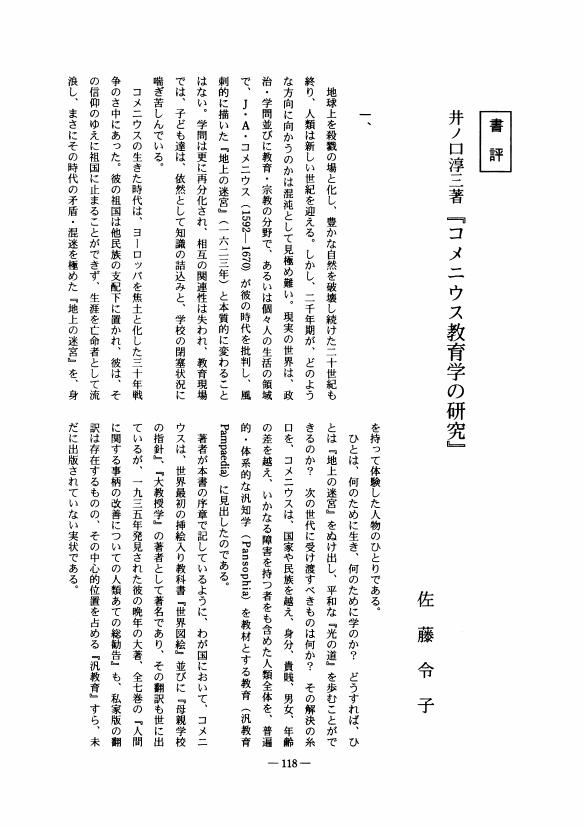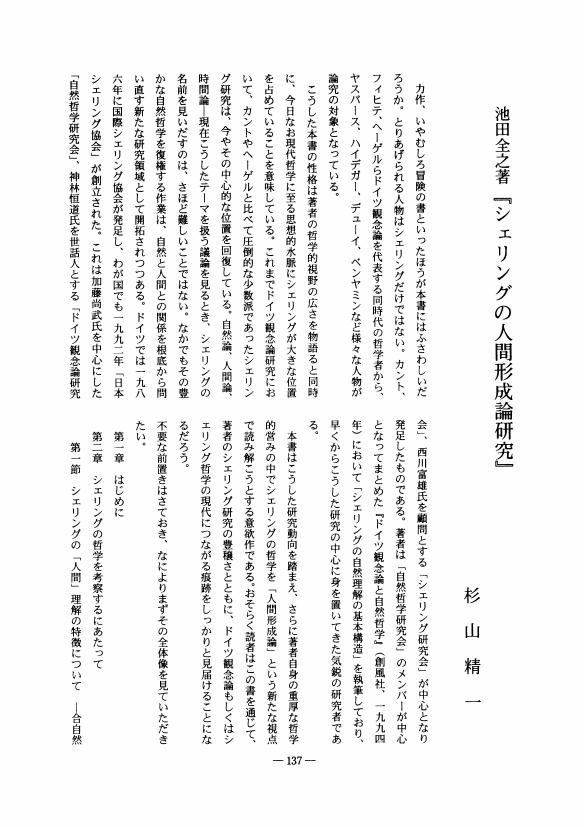1 0 0 0 OA 倉岡正雄著『フレーベル教育思想の研究』
- 著者
- 池田 全之
- 出版者
- 教育哲学会
- 雑誌
- 教育哲学研究 (ISSN:03873153)
- 巻号頁・発行日
- vol.1999, no.80, pp.81-88, 1999-11-10 (Released:2009-09-04)
1 0 0 0 OA 養生雑感
- 著者
- 和田 修二
- 出版者
- 教育哲学会
- 雑誌
- 教育哲学研究 (ISSN:03873153)
- 巻号頁・発行日
- vol.1999, no.79, pp.110-116, 1999-05-10 (Released:2009-09-04)
1 0 0 0 OA 「日本の教育人間学」を考える
- 著者
- 矢野 智司
- 出版者
- 教育哲学会
- 雑誌
- 教育哲学研究 (ISSN:03873153)
- 巻号頁・発行日
- vol.1999, no.79, pp.117, 1999-05-10 (Released:2009-09-04)
1 0 0 0 OA 井ノ口淳三著『コメニウス教育学の研究』
- 著者
- 佐藤 令子
- 出版者
- 教育哲学会
- 雑誌
- 教育哲学研究 (ISSN:03873153)
- 巻号頁・発行日
- vol.1999, no.79, pp.118-124, 1999-05-10 (Released:2009-09-04)
1 0 0 0 OA 田井康雄著『シュライエルマッハー教育思想の研究』
- 著者
- 武安 宥
- 出版者
- 教育哲学会
- 雑誌
- 教育哲学研究 (ISSN:03873153)
- 巻号頁・発行日
- vol.1999, no.79, pp.125-131, 1999-05-10 (Released:2009-09-04)
1 0 0 0 OA 藤川信夫著『教育学における神話学的方法の研究』
- 著者
- 今井 重孝
- 出版者
- 教育哲学会
- 雑誌
- 教育哲学研究 (ISSN:03873153)
- 巻号頁・発行日
- vol.1999, no.79, pp.132-136, 1999-05-10 (Released:2009-09-04)
1 0 0 0 OA 池田全之著『シェリングの人間形成論研究』
- 著者
- 杉山 精一
- 出版者
- 教育哲学会
- 雑誌
- 教育哲学研究 (ISSN:03873153)
- 巻号頁・発行日
- vol.1999, no.79, pp.137-142, 1999-05-10 (Released:2009-09-04)
1 0 0 0 OA 山崎洋子著『ニイル「新教育」思想の研究-社会批判にもとづく「自由学校」の地平-』
- 著者
- 宮寺 晃夫
- 出版者
- 教育哲学会
- 雑誌
- 教育哲学研究 (ISSN:03873153)
- 巻号頁・発行日
- vol.1999, no.79, pp.143-148, 1999-05-10 (Released:2010-01-22)
1 0 0 0 OA 杉浦宏編『日本の戦後教育とデユーイ』
- 著者
- 米澤 正雄
- 出版者
- 教育哲学会
- 雑誌
- 教育哲学研究 (ISSN:03873153)
- 巻号頁・発行日
- vol.1999, no.79, pp.149-150, 1999-05-10 (Released:2009-09-04)
1 0 0 0 OA 研究討議に関する総括的報告
- 著者
- 毛利 陽太郎 林 忠幸
- 出版者
- 教育哲学会
- 雑誌
- 教育哲学研究 (ISSN:03873153)
- 巻号頁・発行日
- vol.1999, no.79, pp.18-21, 1999-05-10 (Released:2009-09-04)
1 0 0 0 OA 学校は、今何が出来るか 公共性の構築へ向けて
- 著者
- 小玉 重夫
- 出版者
- 教育哲学会
- 雑誌
- 教育哲学研究 (ISSN:03873153)
- 巻号頁・発行日
- vol.1999, no.79, pp.22-27, 1999-05-10 (Released:2010-05-07)
- 参考文献数
- 15
1 0 0 0 OA 「学校は何のために」と問うことの意味 教育臨床学の視点から
- 著者
- 諸富 祥彦
- 出版者
- 教育哲学会
- 雑誌
- 教育哲学研究 (ISSN:03873153)
- 巻号頁・発行日
- vol.1999, no.79, pp.27-32, 1999-05-10 (Released:2009-09-04)
1 0 0 0 OA 学校のために、今何が出来るか
- 著者
- 毛利 猛
- 出版者
- 教育哲学会
- 雑誌
- 教育哲学研究 (ISSN:03873153)
- 巻号頁・発行日
- vol.1999, no.79, pp.32-38, 1999-05-10 (Released:2009-09-04)
1 0 0 0 OA 課題研究についての総括的報告
- 著者
- 宇佐美 寛
- 出版者
- 教育哲学会
- 雑誌
- 教育哲学研究 (ISSN:03873153)
- 巻号頁・発行日
- vol.1999, no.79, pp.39-43, 1999-05-10 (Released:2009-09-04)
1 0 0 0 OA 伊藤仁斎における教育思想の構造について 「孔孟の意味血脈」を視座とする教育思想の特質
- 著者
- 山本 正身
- 出版者
- 教育哲学会
- 雑誌
- 教育哲学研究 (ISSN:03873153)
- 巻号頁・発行日
- vol.1999, no.79, pp.44-58, 1999-05-10 (Released:2010-05-07)
- 参考文献数
- 24
Ito Jinsai's educational thought consisted mainly of the relationships among three conceptions; namely, human nature, the Way (of Man), and the teachings (of both Confucius and Mencius). These conceptions in turn were known to him through his inquiry into the essence of the thoughts of Confucius and of Mencius.For Jinsai the Way (of Man) should be found in daily human relations, and it was first generalized and presented to people as teachings by Confucius. However, as people were separated from Confucius's times, they interpreted the Way (of Man) arbitrarily; otherwise, they despaired of their ability to practice morality. To overcome these difficulties, Mencius contended that the Way (of Man) meant humanity and justice in human relations, and that man's inborn nature wa good.Thus Jinsai's educational thought was focused on a problem : how to urge people to participate in daily human relations. It would be said that his thought was one of the prominent achievements in educational thought which was constructed on the basis of Confucianism.
- 著者
- 小林 万里子
- 出版者
- 教育哲学会
- 雑誌
- 教育哲学研究 (ISSN:03873153)
- 巻号頁・発行日
- vol.1999, no.79, pp.59-74, 1999-05-10 (Released:2009-09-04)
- 参考文献数
- 41
Am Ende des 19. Jahrhunderts, als in Hamburg ein staatliches Volksschulwesen eingerichtet wurde, hatten die Volksschullehrer über ihre Arbeit, also Erziehung und Schulverwaltung wenige Rechte zu sagen. Sie kritisierten die Verbürokratisierung der Schule. Um ihre Rechte von der Offentlichkeit anerkannt zu sehen, starteten sie nicht nur eine reformpädagogische Bewegung (Kunsterziehungsbewegung oder Arbeitsschulbewegung), sondern auch eine soziale Bewegung, oder nahmen daran teil. In der Bewegung entwarfen sie die 'neue Schule' als Alternative zur 'alten Schule'. Um diesen Entwurf zu realisieren, verlangten sie öffentlich eingerichtete Versuchsschulen.In der Versuchsschule Berliner Tor, die 1919 entstand, wurde eine Erziehung eingeführt, die auf dem Interesse und der Förderung des Kindes basiert, wobei diese von seiten der Lehrer angefaßt wurden. Die Lehrer der Berliner Tor Schule forderten nicht nur das Recht des Kindes, sondern auch immer dasjenige der Lehrer selbst.Daher stellte sich heraus, daß die Pädagogik 'vom Kinde aus' in der Hamburger Schulreformbewegung aufgrund der Forderung der Lehrer selbst nach Selbständigkeit entworfen wurde.
1 0 0 0 OA 想起としての探究と学習 『メノン』における想起説の再検討
- 著者
- 片山 勝茂
- 出版者
- 教育哲学会
- 雑誌
- 教育哲学研究 (ISSN:03873153)
- 巻号頁・発行日
- vol.1999, no.79, pp.75-92, 1999-05-10 (Released:2010-05-07)
- 参考文献数
- 82
The theory of recollection in the Meno (TRM) has been generally interpreted as the theory 'that learning is recollection of knowledge acquired before birth' (Bluck). Recently Moravcsik and other scholars have argued that only 'learning taking the form of inquiry is recollection'. However, knowing consists of two distinct parts : inquiring and finding out, teaching and learning. 'Plato identifies knowledge with recollection' (Irwin).According to Guthrie, in TRM a distinction is made 'for the first time between empirical and a priori knowledge'. Only the latter (e.g.geometry) is the object of recollection, and genuine knowledge. However, this established view does not correspond with the text (81c5-9, 85c6-7, 97a-c). 'Someone who knows the road to Larisa' (97a9) has empirical knowledge. This is not an analogy, but a concrete example of knowledge (pace Bluck). Recollection covers all knowledge including skills and virtues.At 97-98, Plato distinguishes for the first time between true belief and knowledge. Only the latter is tied down by the considerration of reason (αιτιαζ λογισμοζ), and this is called 'recollection'. This shows Plato's exellent insight. A lot of scholars are 'wrong to restrict aitias logismos, and recollection as a whole, to reasoning relying on logical necessity' (Irwin).Plato insists that (a) all the slave-boy's answers were his own belief, and that (b) these beliefs were originally inside him. The point (a) is just, but does not guarantee (b). The point (b) is a fallacy. This has been the problem with TRM.The insights in Plato's TRM can contribute to modern pedagogy which is urged to reexamine learning itself.
1 0 0 0 OA H・-E・テノルト著小笠原道雄・坂越正樹監訳『教育学における「近代」問題』
- 著者
- 原 聡介
- 出版者
- 教育哲学会
- 雑誌
- 教育哲学研究 (ISSN:03873153)
- 巻号頁・発行日
- vol.1998, no.78, pp.80, 1998-11-10 (Released:2009-09-04)
1 0 0 0 OA W・H・プレーガー著 増渕幸男監訳『シュライアーマッハーの哲学』
- 著者
- 越後 哲治
- 出版者
- 教育哲学会
- 雑誌
- 教育哲学研究 (ISSN:03873153)
- 巻号頁・発行日
- vol.1998, no.78, pp.81, 1998-11-10 (Released:2009-09-04)
1 0 0 0 OA 天野正治 結城忠 別府昭郎編著『ドイツの教育』
- 著者
- 今井 重孝
- 出版者
- 教育哲学会
- 雑誌
- 教育哲学研究 (ISSN:03873153)
- 巻号頁・発行日
- vol.1998, no.78, pp.82, 1998-11-10 (Released:2009-09-04)
















